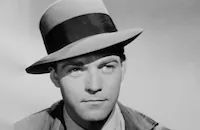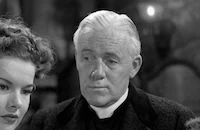The Duke of West Point
Cast & Crew
Alfred E. Green
Louis Hayward
Joan Fontaine
Tom Brown
Richard Carlson
Alan Curtis
Film Details
Technical Specs

Synopsis
Young Steven Early, the son of the American military attache to London, enters West Point after a spectacular career at school in England. Because of his bemused, aristocratic manner, his fellow plebes call him "the Duke." Steve rooms with Robert "Sonny" Drew and John "Jack" West, both of whom are enthusiastic about being at the Academy. From the first day, Steve antagonizes upper classman Cadet Strong and the two become further estranged when Steve falls for Strong's girl, Ann Porter, the daughter of athletic trainer Doc Porter. When Jack receives word that his widowed mother is in desperate trouble and he may have to leave the Academy, Steve sneaks out and secretly wires her money, asking her never to reveal the source. Because he is caught and refuses to reveal the reason for his absence, his fellow classmen "silence" him. Although Ann initially chastizes Steve for his attitude, soon her feelings for him grow. For the next two years, none of his classmates, except Sonny and Jack, will speak to him, despite the fact that he has become the top in his class academically and a star athlete. During a practice session for a big ice hockey game with the Canadian cadet team, Sonny's neck is broken in his first chance off the bench. With this final blow, Steve decides that he will try hard to win the game for Sonny, but after that he will resign. The team wins and Sonny, though he possibly will be bedridden for the rest of his life, is elated that Steve has worn his jersey skating to victory. Just after the win, Jack receives word from his mother that Steve was the person who had helped her through her financial crisis. When he realizes that Steve had left barracks only to help him, he tells Strong, who then arranges for the entire school to "welcome" him as an upper classman. Happy at last with life at West Point, Steve shows Ann a newspaper item that announces their engagement.

Director
Alfred E. Green
Cast

Louis Hayward

Joan Fontaine

Tom Brown

Richard Carlson

Alan Curtis

Charles D. Brown
Jed Prouty

Marjorie Gateson
Emma Dunn

Donald Barry
Gaylord Pendleton

George Mckay

James Flavin
Kenneth Harlan
Nick Lukats

Jonathan Hale
William Bakewell
Art Raymond
Anthony Nace

Mary Mclaren
Edward Earle
Alan Connor

Charles Irwin
Tom Hanlon
Crew
Howard Anderson
Maj. Alonson Bekins
Ray Binger
William Bridgehouse
George Bruce
John Burch
John E. Burch
Arnold Eddy
Charles Kerr
Hank Moslon
James Murray
Robert Planck
John Ducasse Schulze
Lynn Shores
Earl C. Sitar
Edward Small
Richard Talmadge
Frank Tours
Lieut. Walter K. Tuller Jr.
Grant Whytock

Film Details
Technical Specs

Quotes
Trivia
Notes
Motion Picture Herald credits J. V. Schwartz with the film's sound, although Earl C. Sitar is given credit on the film. According to items in the AMPAS Library file on the film, the film went into general release on the East Coast on December 29, 1938 but did not open in Los Angeles until January 1939. A feature article in International Photographer in November 1938 named football star "Dutch" Wilcox as the person who actually threw the spectacular pass during one of the film's football sequences which, according to Hollywood Reporter, was made especially for the film. The film's pressbook noted that the Rose Bowl in Pasadena, CA. was substituted for West Point's Michie Stadium, although according to news items in Hollywood Reporter, background shots and some exteriors of West Point were made on a three-week location unit shoot in June and July 1938. According to Motion Picture Herald, this was the first Edward Small production for United Artists after the initiation of a new agreement between them. Small released through United Artists several years previously but had subsequently gone to other companies. News items in Hollywood Reporter noted that Jack Dunn, an English ice skater who had headed the 1936 British Olympic team at the age of twenty-one, was scheduled to co-star in the film with Rochelle Hudson. After being hospitalized in early July 1938 for a streptococci eye infection, Dunn died ten days later of Tularemia, a rare blood disease which comes from the handling of rabbits, without having begun this picture. Dunn's death caused the start of the film's production to be delayed for several weeks, at which time Louis Hayward took over Dunn's role and Joan Fontaine took over Hudson's. According to a Hollywood Reporter news item, actor Richard Carlson was borrowed from Selznick-International for his role in the picture. According to an ad in Film Daily on June 2, 1938, M-G-M was planning to make a film about the ice hockey rivalry between the American and Canadian military academies starring Robert Taylor. The film, which was to be titled Hands Across the Border, was never made.












